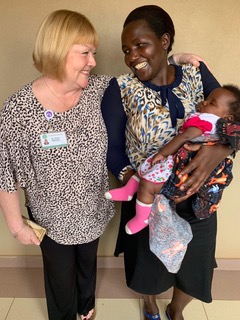
This blog was written by Professor Grace Edwards, Professor of Midwifery Education and Practice, Aga Khan University.
Teaching midwifery in Africa has been the most challenging, but rewarding experience of my career. Before I moved to Kampala, Uganda, I thought I was prepared mentally and clinically for working in a low-resource country. I wasn’t!! I have always maintained my clinical competence and before working abroad I was one of the first consultant midwives working in Liverpool Women’s hospital, one of the largest single-site hospitals in Europe. But nothing prepared me for working in a hospital with over 100 births a day with only five midwives on duty and no privacy, pain relief, or support for labouring women exacerbated by the limited skills of the midwives who worked there. However, once I got over the shock, I realised that working clinically helped consolidate my expertise, both clinically and academically and has enhanced my skills in contextualising the cultural components in a locally sensitive manner.
This experience also developed my skills in leading others and creating sustainable education models. I was also well-placed for identifying training needs and knowledge gaps in midwifery care especially as there is no continuing professional development programme. I developed a competency-based emergency skills course using the low dose high-frequency approach endorsed by Jhpiego (2013). Their work demonstrated that learning delivered in small doses within the clinical environment to the entire team using short lectures and real-time simulation practices, then giving immediate feedback, and ongoing support for performance can improve skills and save lives. Evaluation showed immediate improvements in midwives’ emergency clinical responses which was very encouraging. Sustainability for any programme is essential and I was able to identify clinical champions within my own students, all of whom study part-time and work in the local hospitals to develop their skills as clinical leaders and role models.
The Nursing Now Nightingale Challenge came at just the right time. On behalf of Aga Khan University, I signed up with the pledge to offer leadership training for young nurses and midwives in Uganda. The university supported me in developing the programme, offering the courses free of charge and paying for subsistence for the participants. I worked closely with the country co-ordinator for Nursing Now, Catherine Odeke, and the now Commissioner for Nursing and Midwifery in Uganda, Beatrice Amuge. To date we have successfully offered 11 five-day leadership workshops to over 324 young nurses and midwives across Uganda.
The Nursing Now campaign has helped us to focus on a challenge here in Uganda, and develop a solution to help improve care for women and their families. This has been due to good teamwork, outstanding midwifery champions and support from the university. It is a long, but worthwhile process but in the words of an African proverb “If you want to go fast, go alone – if you want to far, go together”.
Reference


